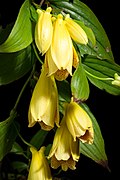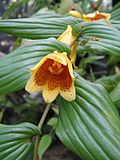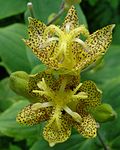Tricyrtis
| Tricyrtis | |
|---|---|

| |
| Tricyrtis hirta | |
| Scientific classification | |
| Kingdom: | Plantae |
| Clade: | Tracheophytes |
| Clade: | Angiosperms |
| Clade: | Monocots |
| Order: | Liliales |
| Family: | Liliaceae |
| Subfamily: | Calochortoideae |
| Genus: | Tricyrtis Wall.[1] |
| Type species | |
| Tricyrtis maculata (D.Don) J.F.Macbr. | |
| Synonyms[2] | |
| |
Tricyrtis is a genus of Asian flowering plants in the lily family, with approximately 20 known species. The species are commonly known in English as toad lilies. The genus has a native range from the Himalayas to eastern Asia, including China,[3] Japan,[4] Philippines and Taiwan,[5] and a few species are cultivated for their ornamental qualities in other parts of the world.
Description
Tricyrtis are herbaceous perennials with creeping rhizomes. The stems are typically erect or maybe ascending, and sometimes branched from the middle to the top. The subsessile leaves are arranged alternately along the stems. The inflorescences are most commonly thyrse or thyrsoid, or rarely the flowers are arranged into a raceme. The showy, solitary flowers are bisexual. Perianth campanulate or trumpet-shaped with six free tepals arranged into two whorls: the outer whorl has nectar secreting pouches, while the inner whorl has upright tepals with dorsal crests.[6] The tepals are white or yellow with purplish spots, usually recurved or reflexed. The six stamens are inserted at base of the tepals, and the filaments are slightly flattened, forming a short tube. The anthers are dorsifixed. The three-loculed ovary have many ovules per locule. The styles are arranged into a column. The three-angled fruits are broadly cylindrical capsules and when ripe release many small, flat, ovate to orbicular shaped seeds.[3]
Taxonomy
The genus is subdivided into four sections,[citation needed] with about 20 species. Accepted species include:[2]
Cultivation
Tricyrtis species are perennial herbaceous plants that grow at the edge of forests. They prefer shade or part shade and rich, moist soil. Toad lilies bloom in summer to fall. They are hardy enough to handle sudden changes of winter from mild to blustery cold.[8]
See also
References
- ^ Wallich 1824–1826, p. 61.
- ^ a b Kew World Checklist of Selected Plant Families
- ^ a b "Tricyrtis Wallich". Flora of China.
- ^ Maki, Masayuki; Morita, Hiroko; Oiki, Syuji; Takahashi, Hiroshi (1999). "The Effect of Geographic Range and Dichogamy on Genetic Variability and Population Genetic Structure in Tricyrtis Section Flavae (Liliaceae)". American Journal of Botany. 86 (2). Botanical Society of America: 287–292. doi:10.2307/2656945. JSTOR 2656945. PMID 21680367.
- ^ George Schmid, W. (2002). An encyclopedia of shade perennials. Portland, Or.: Timber Press. p. 312. ISBN 0-88192-549-7.
- ^ Ronse De Craene (2010-02-04). Floral Diagrams: An Aid to Understanding Flower Morphology and Evolution. Cambridge University Press. pp. 105–. ISBN 978-1-139-48455-8.
- ^ a b Masayuki Maki, Hiroko Morita, Syuji Oiki and Hiroshi Takahashi. 1999. The effect of geographic range and dichogamy on genetic variability and population genetic structure in Tricyrtis section Flavae (Liliaceae). Am J. Bot. 86: 287-292.
- ^ Cox, Jeff (1998 by Rodale Press) Perennial All-Stars: The 150 Best Perennials for Great-Looking, Trouble-Free Gardens, pg. 305
Bibliography
- Wallich, Nathaniel (1824–1826). Tentamen Florae Napalensis Illustratae. Calcutta: Asiatic Lithographic Press. Retrieved 5 December 2015.
- Pink, A. (2004). Gardening for the Million. Project Gutenberg Literary Archive Foundation. ISBN 1-4264-5707-3.
- Diversity of Life: Tricyrtis[permanent dead link] - retrieved 6 June 2006
- Kim, Jung Sung; Hong, Jeong-Ki; Chase, Mark W.; Fay, Michael F.; Kim, Joo-Hwan (May 2013). "Familial relationships of the monocot order Liliales based on a molecular phylogenetic analysis using four plastid loci: matK, rbcL, atpB and atpF-H". Botanical Journal of the Linnean Society. 172 (1): 5–21. doi:10.1111/boj.12039.
- Kono, Yoshiko; Peng, Ching - I; Chao, Chien - Ti; Oginuma, Kazuo (2015). "Karyomorphological study of Taiwanese Tricyrtis (Liliaceae) and the taxonomic implication". Chromosome Botany. 10 (2): 61–66. doi:10.3199/iscb.10.61.
- Wan Pyo Hong, Sophia; L. Jury, Stephen (9 July 2012). "Phylogeny and Molecular Evolution of Tricyrtis (Liliaceae s.l.) Inferred from Plastid DNA matK Spacer Nucleotide Sequences". Journal of Plant Studies. 1 (2). doi:10.5539/jps.v1n2p1. Retrieved 19 September 2015.
- Hong, S. W.-P.; Jury, S. L. (7 September 2011). "Phylogeny and divergence times inferred from rps16 sequence data analyses for Tricyrtis (Liliaceae), an endemic genus of north-east Asia". AoB Plants. 2011: plr025. doi:10.1093/aobpla/plr025. PMC 3186281. PMID 22476495.
- Wan Pyo Hong, Sophia; L. Jury, Stephen (9 July 2012). "Phylogeny and Molecular Evolution of Tricyrtis (Liliaceae s.l.) Inferred from Plastid DNA matK Spacer Nucleotide Sequences". Journal of Plant Studies. 1 (2). doi:10.5539/jps.v1n2p1.
External links
 Data related to Tricyrtis at Wikispecies
Data related to Tricyrtis at Wikispecies Media related to Tricyrtis at Wikimedia Commons
Media related to Tricyrtis at Wikimedia Commons










